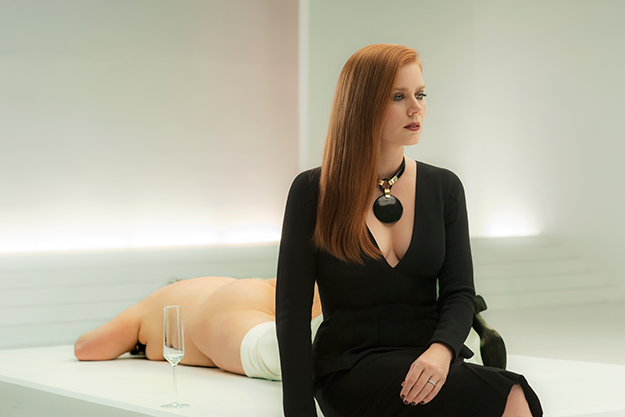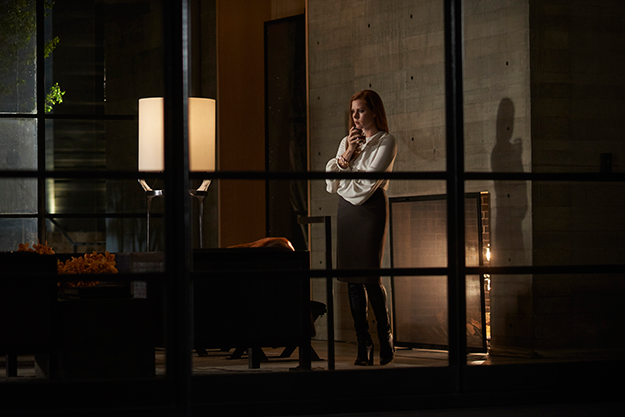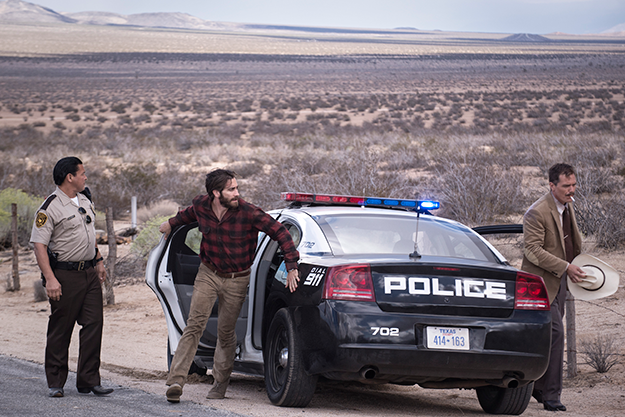Deep Focus: Nocturnal Animals

The second effort by fashion designer turned writer-director Tom Ford (A Single Man) is a roadside horror film wrapped inside a chichi relationship movie. That could have made a good combination for a go-for-broke black comedy, but there are only isolated laughs in this exquisite, alienating picture. It isn’t scary-funny—it’s scary-stultifying. Amy Adams plays a cutting-edge Los Angeles gallery owner who receives a not-yet-published novel in the mail from her struggling-writer first husband (Jake Gyllenhaal), just when she happens to be questioning the passion, commitment, and values of her “handsome, dashing” but also materialistic and empty second husband (Armie Hammer). The movie cuts between her immersive reading of the thriller and her spiritually desolate current life, when it isn’t flashing back to her first marriage. It’s a triple-decker conception that ends up flat as a crepe.
The novel, like this movie, is called Nocturnal Animals. The scenes from this story-within-a-story depict, with brute elegance, the vulnerability of a civilized man (also played by Gyllenhaal) and his attractive wife and teenage daughter (Isla Fisher and Ellie Bamber) as they fall prey to psychotic thugs on a lonely stretch of highway late at night. Before the movie is over, we learn that the novelist used to call his ex-wife a “nocturnal animal” (she cannot sleep); from the get-go we’re cued to see that this L.A. gallerista will respond to the text ultra-personally. With Gyllenhaal in the dual roles, it doesn’t take long to realize that she’s identifying the fictional hero (or is it anti-hero?) with her former spouse. He had dedicated the book to her, and it pivots on the protagonist’s feelings of rage and impotence over the loss of his family.
Even so, our gal reacts too viscerally to every dark turn in the narrative. Her differing methods of slamming the book shut or pushing it away certainly allow Ford to achieve some snappy staccato effects. Still, you can’t help wondering whether this denizen of L.A.’s curdled crème de la crème has ever read another suspense novel. (Aren’t Michael Connelly and Lee Child the height of Angeleno chic?)

The cuts between her and the fictional leading man become laughable. When they’re bathing at the same time, we wonder whether the book is functioning like the Necronomicon in the Evil Dead movies, determining each of her new moves. Perhaps we’re supposed to feel that the novel is so grisly that it would make us want to take a shower, too—a high-tech downpour in a pricey marble stall, since her house is as expensive and over-styled, in its own slab-like way, as the suburban manse in Mon Oncle.
Ford aims to counterpoint the primal intrigue of the story-within-the-story with supposedly fascinating questions about the heroine’s past. Too bad his script spells everything out in flash cards. She wanted to be an artist but decided she was too much a realist, or cynic; the writer’s guileless virtue attracted her, then made her lose faith in him after they were married. In one of Ford’s grievous storytelling mistakes, she tells a colleague that she left the writer for her current husband in a particularly brutal way. After hearing that confession, no breakup would feel extreme enough. Sure enough, when Ford delivers the split in a flashback, it’s dreadful in a familiar, soap-opera way, not frightening.
The movie’s three-pronged structure derives from its little-known source book: Austin Wright’s 1993 novel, Tony and Susan, is just as beautifully honed, and equally tricky, but its present-day story is more open-ended, middle-class and lifelike. Ford’s adaptation sticks closely to Wright’s pungent, shrewdly observed scenes of crime and punishment, whether focusing on the unholy road-hogging trio (Aaron Taylor-Johnson, Karl Glusman, Robert Aramayo) or on Michael Shannon’s dry, intense lawman, who rouses the one good guffaw in the movie when he says he’s “OK” after a Brobdingnagian coughing fit. In a couple of genuinely alarming sequences, Ford displays rare gifts for maintaining a mood of simmering violence and for staging action that is all the more haunting for being inexact and hard to figure out. All the actors who play characters at mortal risk are top-notch at embodying gut-wrenching fear. The two murders that take place off-screen and the two that unfold before our eyes are equally disturbing. But overall Nocturnal Animals is one non-thrilling thriller.

Ford has relocated both the present and “fictional” action, from the book’s Chicago and Pennsylvania to Los Angeles and West Texas, respectively. He’s largely re-imagined the framing device to excoriate the contemporary art scene and to repeat the old saw that women end up becoming their own mothers—in this case, a haute-bourgeois harpy (Laura Linney, overacting giddily). Ford, who shot the film a year ago, has one sublime opportunistic riff: the heroine describes her status-conscious, Republican mom in a stream of adjectives that mirror liberals’ disdain for President-elect Trump. You can write the description yourself: “Racist?” Yup. “Xenophobic?” Ditto.
Unfortunately, Ford lampoons the art scene just as obviously, but far less entertainingly. He begins the film with a gallery opening that features morbidly obese women nude except for boots, gloves, and cowboy hats, cavorting like all-American cheerleaders, then slumping down to rest on off-white slabs. Later, Jena Malone carries her off-kilter wit into the role of a museum operative who’s so overdressed, it’s as if Malone had jumped to the Capitol in The Hunger Games. (She has the best topical gags, about her smartphone.) And Michael Sheen conveys an air of drollery as a gay man who’s happy in a heterosexual marriage. They’re the lucky ones. Adams expertly modulates her performance in both past and present tenses, but without any room for spontaneity or organic growth, she’s just a bird in a gilded cage.
The movie piles portents on top of melodrama. When Adams starts to open the package that contains the novel, she gives herself a terrible paper cut. Are we being warned about the bloody Fickle Finger of Fate? Later, a small black bird dashes itself against her window. Ford’s gravest error, though, is thinking that he can enlarge the action of the novel with a satiric evocation of today’s high-cultural cluelessness. Nocturnal Animals is intricate, polished, and stillborn. It’s an immaculate misconception.
Michael Sragow is a contributing editor to Film Comment and writes its Deep Focus column. He is a member of the National Society of Film Critics and the Los Angeles Film Critics Association. He also curates “The Moviegoer” at the Library of America website.







